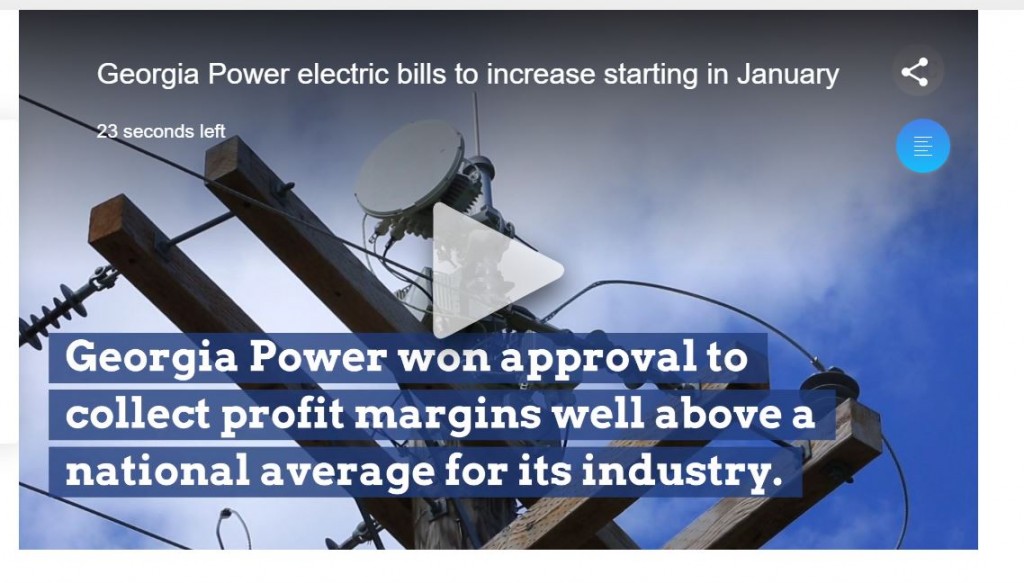
By: Matt Kempner
mkempner@ajc.com
AJC CONTINUING COVERAGE POWER RATES Watch Now
Georgia Power customers will see their monthly electric bills rise, with some of the increase kicking in next month and growing over three years, state regulators ruled Tuesday, sparking criticism from consumer groups.
Residential customers could see their bills rise annually more than $175 on average once the rate and fee increases are fully phased in, based on an extrapolation of data shared by a member of the Georgia Public Service Commission.
The increase next year alone would be about $71 per average household, according to PSC Vice Chairman Tim Echols. The $1.77 billion plan, affecting 2.6 million customers, was approved by four of the PSC’s five elected commissioners.
Georgia Power said its current rates are below the national average and that the PSC’s decision “enables the company to continue investing in Georgia’s energy future,” by boosting the reliability of the state’s electrical system, repairing storm damage and complying with regulations.
Consumer, environmental and solar energy organizations were particularly critical of an increase in monthly fixed fees, though it was less than what the company originally proposed when it requested what would have been one of the highest fixed base charges among major utilities nationwide.
With the PSC’s vote Tuesday, Georgia Power won backing to collect profit margins well above a national average for its industry.
The profit band approved by the PSC extends as high as the company requested. As a regulated monopoly, Georgia Power cannot raise its rates without the PSC’s OK.
The high profits should help keep the company’s credit score from dipping, which ultimately would have hurt customers who are responsible for Georgia Power’s financial health, Echols said. “I wish we didn’t ever have to raise rates on anything.”
In an email, he wrote that a $5.89-a-month increase “represents a first year total rate impact of 4 to 4.5% — with a second year impact of an additional 2 to 2.5% coming in 2021, and third year impact of a 4.5 to 5% in 2022.”
Neither the PSC nor Georgia Power provided a total dollar figure for the cost to average residential customers. Tom Krause, a spokesman for the PSC, said the agency’s staff “don’t believe it to be a reliable indicator” because there are too many variables.
PSC Chairman Lauren “Bubba” McDonald, who had pushed to cut Georgia Power’s targeted profits and opposed Tuesday’s changes, said of the company, “they ought to be happy.”
The share price of Southern Company, Georgia Power’s parent, closed 2.3% higher Tuesday following news of the PSC’s decision.
The electric bill increases were backed by the PSC’s Echols, Tricia Pridemore, Chuck Eaton and Jason Shaw.
Georgia Power said it needed more money to deal with growing expenses, such as those for storm repairs and dealing with leftover ash ponds at its coal plants. Its initial proposal could have cost the average residential customer an extra $200 a year had it been fully phased in.
It also proposed shifting the makeup of bills by nearly doubling a $10-a-month basic fixed fee. Instead, the PSC voted for the fee to rise to $12 in 2021 and $14 in 2022. Consumer groups and others warned the various increases proposed by Georgia Power would hit lower income customers particularly hard. They also said the hike would reduce how much customers can save by curbing their use of electricity.
Portions of Georgia Power’s request had been opposed by a wide variety of entities, from the PSC’s own staff to business organizations and the U.S. Department of Defense, which gets electricity from the company at military bases in the state. The PSC’s staff had pushed back on a number of fronts, from ratepayers having to cover bonuses for Georgia Power executives, to profits that staff said were higher than necessary for the company to keep a healthy credit rating.
Some business groups settled a portion of their differences with Georgia Power.
Some environmental groups also praised steps to pay for electric vehicle charging station systems and help owners of rooftop solar systems.
But Kimberly Fountain of Consumer Reports wrote in a press release that “In seeking this fee hike, Georgia Power is putting profits over people and the members of the Georgia Public Service Commission who approved it are failing to protect those they are representing.”
And Bryan Jacob of the Southern Alliance for Clean Energy wrote that the PSC’s vote “subordinated interests of residential customers and small businesses to those of big business.”
Beyond Tuesday’s approved hikes, additional bill increases may be looming for Georgians.
They include costs tied to Georgia Power’s multi-billion-dollar overruns on the nuclear expansion of Plant Vogtle and sister company Atlanta Gas Light’s request to raise rates affecting more than 1.6 million customers of natural gas marketers.
PSC staff said earlier this month that $1 billion in Vogtle expenses could be added to customers’ bills in the next three years, assuming the years-delayed project meets the company’s latest timeline.
That would represent only a portion of the Vogtle project’s cost to ratepayers over time.
And on Thursday, the PSC is slated to vote on AGL’s proposed rate increase, which would appear as a higher line item on natural gas marketers’ bills to customers. AGL, like Georgia Power, has asked to collect profits above a national average for its industry.
Liz Coyle, the executive director of consumer advocacy group Georgia Watch, said if the PSC is going to allow such high profits those costs will come directly out of customers pockets. The PSC, she said, should find ways to mitigate the impact on consumers.
WHY IT MATTERS
Georgia Power said a rate increase will cover rising costs, including those tied to storm damage and potentially toxic coal ash. For consumers, fees and rates would begin rising in January with additional increases phased in over three years. The increase in 2020 alone is expected to top $70 a year for the average residential customer.
